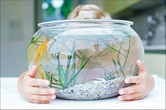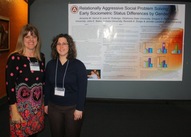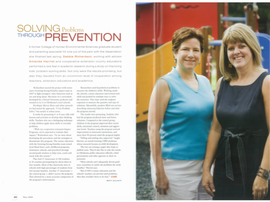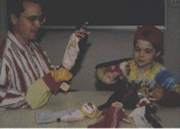Current Research
Families and Schools for Health (FiSH) Project
This FiSH project explores the psychosocial correlates of childhood obesity. We have a multidisciplinary team that has
followed almost 1,200 rural children from 1st through 4th grade. In 2017-18 we extended the project to include data collected from the same FiSH children when they are seniors in high school. We collected data from almost 400 high school seniors who were originally in the study as 1st graders. Data assessed variables assessed during elementary school (biometric height, weight, waist circumference measures; psychosocial aspects of behavior and self-cognitions as well as family and peer group dynamics; eating and physical activity patterns) but added some new assessments, for example of ACES (Adverse Childhood Experiences). For more information, go to the FiSH Project page.
Grants: The FiSH Project has been funded by the USDA (U.S. Department of Agriculture), OCAST (Oklahoma Center for the Advancement of Science and Technology); Oklahoma Agricultural Experiment Station, College of Human Sciences; the Bryan B. Close Professorship; the Endowed Parenting Professorship Bridge Grant; College of Human Sciences Laboratory and research program for equipment, software and databases; and George Kaiser Endowed Chairs in Child & Family Resilience, Child Development, and Family and Community Policy.
Publications: See FiSH Publications page for a list of all manusucripts based on FiSH Project Data. Most recent publications:
Rutledge, J. M., Harrist, A. W., Hubbs-Tait, L., Larzelere, R. E., Topham, G. L., & Shriver, L. H., & Swindle, T. (in press). A longitudinal study of parenting style and child weight with moderation by American Indian ethnicity. Manuscript accepted for publication at Parenting: Science and Practice.
Harrist, A. W., Topham, G. L., Hubbs-Tait, L., Shriver, L. H., & Swindle†, T. M. (2017). Psychosocial factors in child obesity: Examples from an innovative line of Inquiry. Child Development Perspectives, 11, 275-281. doi:10.1111/cdep.12245
Harrist, A. W., Swindle, T. M., Hubbs-Tait, L., Topham, G. L., Page, M. C., & Shriver, L. H. (2016). The social and emotional lives of overweight, obese, and severely obese children. Child Development, 87, 1313 – 1646. doi:10.1111/cdev.12548
Student Opportunities: Over 100 undergraduate and graduate students have worked as Research Assistants on the FiSH Project. Students can work as volunteers, for course credit, for hourly pay, or via graduate assistantships. Students who work on the project may use FiSH data for honors theses, masters theses, and dissertations (see list of completed student projects). If you would like to work on the FiSH Project, contact Dr. Harrist.
Family Resilience: Advances in Conceptualization & Application
Dr. Carolyn Henry. Dr. Amanda Morris, and I are working to expand theoretical understanding of resilience at the family level. Publications related to this effort include:
Henry, C. S., & Harrist, A. W. (anticipated 2021). Stress and resilience theories. In K. Adamsons, A. Few-Demo, C. Proulx,
& K. Roy (Eds.), Sourcebook of family theories and methodologies. Manuscript accepted at Springer.
Schaecher, M. H., & Harrist, A. W. (2020). Schools as resilient communities building resilience in children. In A. W. Harrist,
& S. M. Wilson (Series Eds.) & M. Stout & A. W. Harrist (Vol. Eds.), Emerging issues in family and individual resilience:
Building community and family resilience: research: research policy, and programs (Vol. 4). Springer International.
Harrist, A. W., Henry, C. S., Liu, C., Morris, A. S. (2018). Family resilience: The power of rituals and routines in family
adaptive systems. In B. Fiese (Ed.), The APA handbook of contemporary family psychology, Volume 1: Foundations,
methods, and changing forms (pp. 223–239). Washington, DC: American Psychological Association Press.
Henry, C. S., Morris, A. S., & Harrist, A. W. (2015). Family resilience: Moving into the third wave. Family Relations, 64, 22-
43. doi:10.1111/fare.12106. Criss, M. M., Henry, C. S., Harrist, A. W., & Larzelere, R. E. (2015). Interdisciplinary and
innovative approaches to strengthening family and individual resilience: An introduction to the special issue. Family
Relations, 64, 1-4. https://doi.org/doi:10.1111/fare.12109
Criss, M. M., Henry, C. S., Harrist, A. W., & Larzelere, R. E. (2015). Interdisciplinary and innovative approaches to
strengthening family and individual resilience: An introduction to the special issue. Family Relations, 64, 1-4.
https://doi.org/10.1111/fare.12109
Children’s Social Problem Solving Projects
(a) Relational & Non-Relational Social Problem-Solving Project
This project explores young children’s use of relationally-oriented social problem-solving (SPS) strategies. In the past, links have been shown between children’s physically aggressive SPS strategies and behavior; we are seeking to expand this literature by examining relationally-aggressive and relational-nonaggressive (i.e., manipulative) SPS styles. We have coded children’s hypothetical responses to social dilemmas (see cartoon prompts below), data gathered as part of the Child Development Project. We are interested in exploring the antecedents, gender and age differences, and social correlates of these relationally-aggressive and -manipulative strategies.
(a) Relational & Non-Relational Social Problem-Solving Project
This project explores young children’s use of relationally-oriented social problem-solving (SPS) strategies. In the past, links have been shown between children’s physically aggressive SPS strategies and behavior; we are seeking to expand this literature by examining relationally-aggressive and relational-nonaggressive (i.e., manipulative) SPS styles. We have coded children’s hypothetical responses to social dilemmas (see cartoon prompts below), data gathered as part of the Child Development Project. We are interested in exploring the antecedents, gender and age differences, and social correlates of these relationally-aggressive and -manipulative strategies.
Cartoon prompts used to assess children's generation of social problem solving solutions
.
.
Grants: The data being analyzed for the Relational SPS Project was originally collected with funds from Research Grant MH 42498 from NIMH to PI’s Dr. Ken Dodge, Greg Pettit, and John Bates. Recent funding has come from the National Science Foundation Research Experience for Undergraduates (NSF REU), granted to Dr. Melanie Page, and the Bryan Close Professorship.
Manuscripts in Prepration
Harrist, A. W., Rutledge, J. R., Pettit, G. S., Dodge, K. A., Bates, J. E., & Lansford, J. E. (2019). Using People, Power, or Things to Get Your Way: The Relational and Non-Relational Use of Aggression and Manipulation in Children’s Social Problem Solving. (Manuscript in preparation)
Harrist, A. W., Rutledge, J., Pettit, G. S., Bates, J. E., & Dodge, K. A. (2019). Relationally Aggressive Social Problem Solving: Early Sociometric Status Differences by Gender. (Manuscript in preparation)
Harrist, A. W., Rutledge, J., Dotson, R. A., Pettit, G. S., Bates, J. E., & Dodge, K. A., & Lansford, J. E. (2019). Marital Conflict and Children’s Social Problem Solving: Predicting Relational and Non-Relationally Aggressive Styles. (Manuscript in preparation)
Sample Undergraduate Student Presentations (* denotes student contributor):
Smith*, M., & Harrist, A. W. (2008, April). Academic and Social Profile of Children Who Solve Social Problems with Relational Manipulation. Poster presented at the 20th biennial Conference on Human Development, Indianapolis, IN.
Harrist, A. W., Rutledge, J. M., Bedford*, A. B., Montemurro-Reding*, P., Howell*, N., Fuson*, A. A., Wakefield*, C., Dotson*, R. A., Dodge, K. A., Pettit, G. S., & Bates, J. E.(2006, March). Using Relationships to Get what You Want: Relationally Manipulative and Relationally Aggressive Social Problem Solving. Poster presented at the Society for Research on Human Development, Ft. Worth, TX.
Burke*, C. T., & Harrist, A. (2006, November). School and Home Profile of Relationally Manipulative Children. Poster presented at the Annual Biomedical Research Conference for Minority Students, Anaheim, CA.
Diggs*, H. A., Harrist, A. W., Bates, J. E., Pettit, G. S., & Dodge, K. A. (2007, March). Exploring the Predictive Relation of Aggressive Social Problem Solving and Impulsivity on Adolescent Drug Use. Poster presented at the biennial meeting of the Conference on Human Development, Boston, MA.
Dotson*, R. A., Harrist, A. W., Bates, J. E., Pettit, G. S., & Dodge, K. A. (2005, April). Predictors and Gender Differences in Children’s Relationally Aggressive Response Generation. Poster presented at the biennial meeting of the Society for Research on Child Development, Atlanta, GA.
Student Opportunities: Undergraduate and graduate students interested in children’s social cognition/social problem solving may gain access to our data. The Child Development Project follows children from kindergarten into adulthood, so there are many types of conceptual models you might test. If you would like to work on this project, contact Dr. Harrist.
A recent paper conceptualized by a student in a graduate seminar used CDO data:
Lin, H., Harrist, A. W., Lansford, J. E.., Pettit, G. S., Bates, J. E., &. Dodge, K. A. (2020). Adolescent social withdrawal,
parental psychological control, and parental knowledge across seven years: A developmental cascade model. Journal
of Adolescence, 81, 124-134. https://doi.org/10.1016/j.adolescence.2020.04.007
Another publication that was based on a student's dissertation using CDP data is:
Harrist, A. W., Achacoso, J. A., John, A., Pettit, G. S., Bates, J. E., & Dodge, K. A. (2014). Reciprocal and complementary
sibling interactions: Relations with socialization outcomes in the kindergarten classroom. Early Education and
Development, 25, 202-222.
Manuscripts in Prepration
Harrist, A. W., Rutledge, J. R., Pettit, G. S., Dodge, K. A., Bates, J. E., & Lansford, J. E. (2019). Using People, Power, or Things to Get Your Way: The Relational and Non-Relational Use of Aggression and Manipulation in Children’s Social Problem Solving. (Manuscript in preparation)
Harrist, A. W., Rutledge, J., Pettit, G. S., Bates, J. E., & Dodge, K. A. (2019). Relationally Aggressive Social Problem Solving: Early Sociometric Status Differences by Gender. (Manuscript in preparation)
Harrist, A. W., Rutledge, J., Dotson, R. A., Pettit, G. S., Bates, J. E., & Dodge, K. A., & Lansford, J. E. (2019). Marital Conflict and Children’s Social Problem Solving: Predicting Relational and Non-Relationally Aggressive Styles. (Manuscript in preparation)
Sample Undergraduate Student Presentations (* denotes student contributor):
Smith*, M., & Harrist, A. W. (2008, April). Academic and Social Profile of Children Who Solve Social Problems with Relational Manipulation. Poster presented at the 20th biennial Conference on Human Development, Indianapolis, IN.
Harrist, A. W., Rutledge, J. M., Bedford*, A. B., Montemurro-Reding*, P., Howell*, N., Fuson*, A. A., Wakefield*, C., Dotson*, R. A., Dodge, K. A., Pettit, G. S., & Bates, J. E.(2006, March). Using Relationships to Get what You Want: Relationally Manipulative and Relationally Aggressive Social Problem Solving. Poster presented at the Society for Research on Human Development, Ft. Worth, TX.
Burke*, C. T., & Harrist, A. (2006, November). School and Home Profile of Relationally Manipulative Children. Poster presented at the Annual Biomedical Research Conference for Minority Students, Anaheim, CA.
Diggs*, H. A., Harrist, A. W., Bates, J. E., Pettit, G. S., & Dodge, K. A. (2007, March). Exploring the Predictive Relation of Aggressive Social Problem Solving and Impulsivity on Adolescent Drug Use. Poster presented at the biennial meeting of the Conference on Human Development, Boston, MA.
Dotson*, R. A., Harrist, A. W., Bates, J. E., Pettit, G. S., & Dodge, K. A. (2005, April). Predictors and Gender Differences in Children’s Relationally Aggressive Response Generation. Poster presented at the biennial meeting of the Society for Research on Child Development, Atlanta, GA.
Student Opportunities: Undergraduate and graduate students interested in children’s social cognition/social problem solving may gain access to our data. The Child Development Project follows children from kindergarten into adulthood, so there are many types of conceptual models you might test. If you would like to work on this project, contact Dr. Harrist.
A recent paper conceptualized by a student in a graduate seminar used CDO data:
Lin, H., Harrist, A. W., Lansford, J. E.., Pettit, G. S., Bates, J. E., &. Dodge, K. A. (2020). Adolescent social withdrawal,
parental psychological control, and parental knowledge across seven years: A developmental cascade model. Journal
of Adolescence, 81, 124-134. https://doi.org/10.1016/j.adolescence.2020.04.007
Another publication that was based on a student's dissertation using CDP data is:
Harrist, A. W., Achacoso, J. A., John, A., Pettit, G. S., Bates, J. E., & Dodge, K. A. (2014). Reciprocal and complementary
sibling interactions: Relations with socialization outcomes in the kindergarten classroom. Early Education and
Development, 25, 202-222.
(b) Evaluation of a Social Problem Solving Skills Program.
This project was conducted as Deborah Richardson’s dissertation and as a pilot study for a comprehensive program conducted by the OCES Family Resiliency Impact Team. ICPS is a program designed to improve young children’s social information processing skills, particularly the response-generation step (the same step we are examining in the Relational SPS Project). This project was unique in that Extension County Educators were used to implement the project by training classroom teachers and collecting pre- and post-test data. Students in the Social Development Lab helped Debbie on the project by conducting some of the reliability coding.
Grants Work for this project was funded, in part, by a TIP (Team Initiative Program) grant from Oklahoma Cooperative Extension program to Deborah Richardson.
Presentations
Richardson, D.L., Harrist, A.W., & Page, M.C. (2009, May). I Can Problem Solve: Impact on Children’s Social Cognitive Skills and Social Competence. Poster presented at the annual Children, Youth, and Families at Risk (CYFAR) Conference, Baltimore, MD.
Richardson, D. L. (2009). Evaluation of Interpersonal Problem-Solving Skills Program for Preschool and Elementary Children. Unpublished doctoral dissertation, Oklahoma State University, Stillwater, OK.
This project was conducted as Deborah Richardson’s dissertation and as a pilot study for a comprehensive program conducted by the OCES Family Resiliency Impact Team. ICPS is a program designed to improve young children’s social information processing skills, particularly the response-generation step (the same step we are examining in the Relational SPS Project). This project was unique in that Extension County Educators were used to implement the project by training classroom teachers and collecting pre- and post-test data. Students in the Social Development Lab helped Debbie on the project by conducting some of the reliability coding.
Grants Work for this project was funded, in part, by a TIP (Team Initiative Program) grant from Oklahoma Cooperative Extension program to Deborah Richardson.
Presentations
Richardson, D.L., Harrist, A.W., & Page, M.C. (2009, May). I Can Problem Solve: Impact on Children’s Social Cognitive Skills and Social Competence. Poster presented at the annual Children, Youth, and Families at Risk (CYFAR) Conference, Baltimore, MD.
Richardson, D. L. (2009). Evaluation of Interpersonal Problem-Solving Skills Program for Preschool and Elementary Children. Unpublished doctoral dissertation, Oklahoma State University, Stillwater, OK.
Parenting Projects Student Opportunities: I also have collected data about parent-child synchrony and parenting styles (via home and lab observations). If you are interested in designing a study using these data, or collecting your own parenting data, please
let Dr. Harrist know and we can discuss the data I have and research questions that might be explored.
Publications & Presentations
Harrist, A. W., & Liu, C. (2018). Parent-child synchrony. In M. H. Bornstein (Ed.), The SAGE encyclopedia of lifespan human development. Los Angeles, CA: Sage. doi:10.4135/9781506307633.n594
Harrist, A. W., Achacoso, J. A., John, A., Pettit, G. S., Bates, J. E., & Dodge, K. A. (2014). Reciprocal and complementary sibling interactions: Relations with socialization outcomes in the kindergarten classroom. Early Education and Development, 25, 202-222. doi:10.1080/10409289.2014.848500
Lin, H., Harrist, A. W., Lansford, J. E.., Pettit, G. S., Bates, J. E., &. Dodge, K. A. (2019). Parental control and social withdrawal across seven adolescent years: A developmental cascade model. Manuscript under review.
Liu, C., Harrist, A. W., Cookston, J. T., & Carrillo, S. (2019). How Parents play: Play style as a function of gender of parent, gender of child, and type of game. Manuscript under review.
Harrist, A. W., Foster, I. R., Russell, C., Carrillo, S., Pettit, G. S., Bates, J. E., & Dodge, K. A. (2019). The natural occurrence of social coaching: Parent and child gender differences. Manuscript in preparation.
let Dr. Harrist know and we can discuss the data I have and research questions that might be explored.
Publications & Presentations
Harrist, A. W., & Liu, C. (2018). Parent-child synchrony. In M. H. Bornstein (Ed.), The SAGE encyclopedia of lifespan human development. Los Angeles, CA: Sage. doi:10.4135/9781506307633.n594
Harrist, A. W., Achacoso, J. A., John, A., Pettit, G. S., Bates, J. E., & Dodge, K. A. (2014). Reciprocal and complementary sibling interactions: Relations with socialization outcomes in the kindergarten classroom. Early Education and Development, 25, 202-222. doi:10.1080/10409289.2014.848500
Lin, H., Harrist, A. W., Lansford, J. E.., Pettit, G. S., Bates, J. E., &. Dodge, K. A. (2019). Parental control and social withdrawal across seven adolescent years: A developmental cascade model. Manuscript under review.
Liu, C., Harrist, A. W., Cookston, J. T., & Carrillo, S. (2019). How Parents play: Play style as a function of gender of parent, gender of child, and type of game. Manuscript under review.
Harrist, A. W., Foster, I. R., Russell, C., Carrillo, S., Pettit, G. S., Bates, J. E., & Dodge, K. A. (2019). The natural occurrence of social coaching: Parent and child gender differences. Manuscript in preparation.




